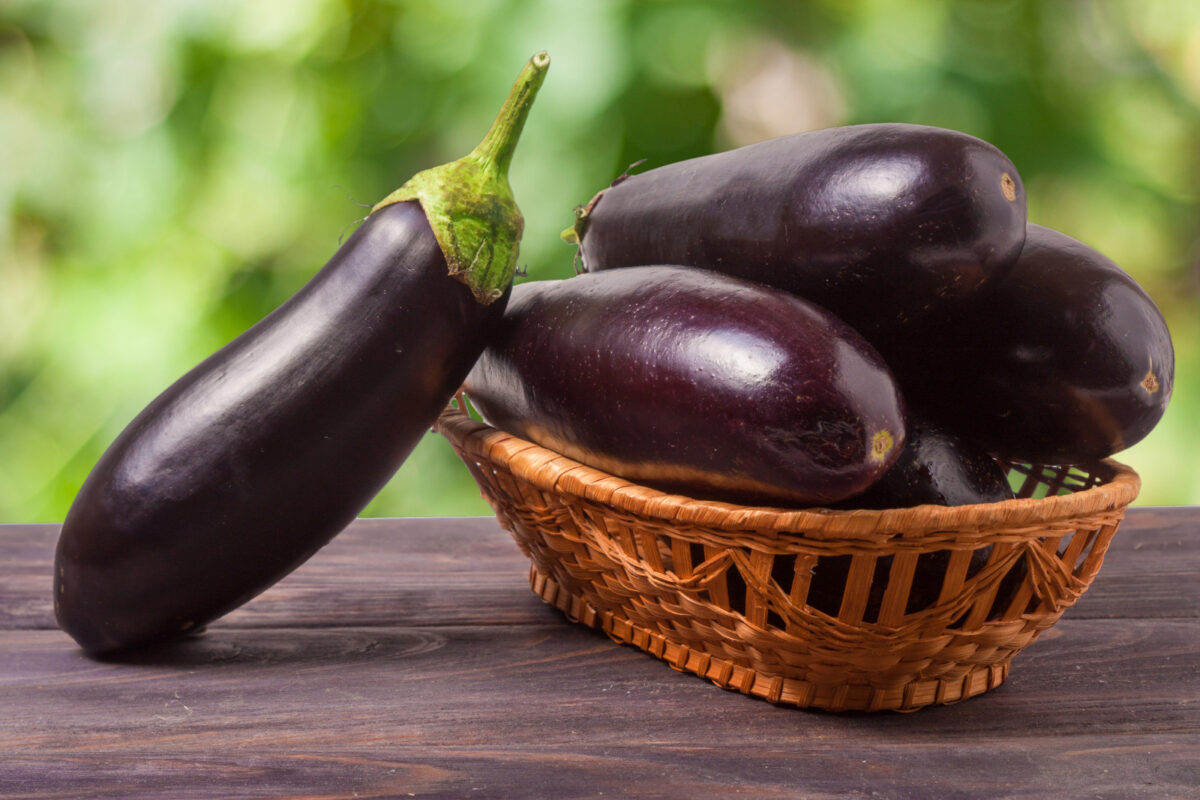Eggplants, or aubergines, are popular worldwide and come in many sizes and colors. The most common variety is large and elongated with dark purple skin.
Despite being a staple in many diets, some people avoid eggplants because they’re part of the nightshade family, which are thought by some to increase chronic inflammation in the body.

However, research does not support the idea that eggplants cause inflammation. In fact, eggplants contain many beneficial plant compounds with anti-inflammatory properties and other health benefits (1).
Learn more about the nutritional qualities of eggplants and what the research says about eggplants and inflammation below.
Does Eggplant Cause Inflammation?
Eggplants are part of the nightshade or Solanaceae family of plants, along with tomatoes, peppers, and potatoes. Many people claim these foods increase inflammation, especially in the context of arthritis (1).
This is because eggplants contain small amounts of solanine, a plant compound known to be toxic when consumed in large quantities. However, the amount of solanine found naturally in plant foods is not known to cause health problems (1).
While older animal studies identified a link between solanine and gut inflammation, recent research has not replicated these findings. Overall, there’s no definitive evidence that eggplant increases inflammation or worsens arthritis pain (2).
In fact, eggplants are rich in nutrients and beneficial plant compounds with antioxidant and anti-inflammatory properties (3).
Should You Avoid Eating Eggplant?
Though the current research does not support the idea that eggplants are inflammatory, some people report increased arthritis symptoms after eating them.
If you have concerns about eggplants or other nightshade vegetables triggering your symptoms, you can eliminate them from your diet for a few weeks and document any changes in your joint pain (2).
If you don’t notice a connection between eggplant and your symptoms, there’s no need to continue avoiding it.
The research does support following an anti-inflammatory diet that limits red meat, sugar, saturated fat, and ultra-processed foods for improving arthritis and other inflammatory conditions (2).
Can Someone Be Allergic to Eggplant?
Though rare, it’s possible to be allergic to one or more of the proteins found in eggplant. Most documented cases of eggplant allergy are very mild, but there have been cases of more severe reactions (4).
As with any food, if you experience an allergic reaction after eating eggplant, it’s important to seek medical attention right away.
Some people may notice they experience digestive symptoms after eating eggplant. Many foods can cause sensitivities, including eggplant (2). Working with a registered dietitian or a gastrointestinal doctor may help you identify the root of your digestive concerns.

Health Benefits of Eggplant
Eggplant is rich in fiber, nutrients, and antioxidants, which have anti-inflammatory properties and are linked with numerous health benefits.
Eggplant Nutrition Facts
Though technically a fruit, eggplant is nutritionally viewed as a non starchy vegetable due to its nutritional composition and culinary uses. It’s low in calories and carbohydrates and rich in fiber (5).
One cup of cooked cubed eggplant contains:
- 35 calories.
- 0.8 g protein.
- 0.2 g fat.
- 8.6 g carbohydrates.
- 2.5 g fiber.
Eggplant also contains small amounts of vitamins and minerals like potassium, magnesium, phosphorus, folate, vitamin A, and choline (5).
Rich in Antioxidants
Antioxidants help fight against harmful free radicals in the body and have anti-inflammatory properties. Eggplants contain many different antioxidants, including anthocyanin, which is responsible for the dark purple pigment of the skin (3).
The antioxidant content of eggplants depends on the variety, shape, and color of the fruit, as well as where it’s grown. Though different colored eggplants contain different types of antioxidants, all are considered anti-inflammatory (1, 3).
Interestingly, studies show small purple eggplants contain the most antioxidants (3).
May Fight Cancer
Eggplants and other nightshade vegetables contain glycoalkaloids, which are compounds that may be beneficial for cancer treatment. Though more research is needed, early test tube studies have found that the glycoalkaloids found in eggplants may help treat lung cancer (3).
In addition, eggplants are a good source of fiber. High-fiber diets are known to lower the risk of certain types of cancer, like colon and stomach cancer (3).
May Help Blood Sugar Management
Like other non-starchy vegetables, eggplants are rich in fiber and low in carbohydrates. High-fiber foods slow digestion, which helps minimize blood sugar spikes (5).
Experts recommend people with blood sugar concerns fill half their plate with non starchy vegetables, which can include eggplants. This approach is also known to help weight management efforts (7).
Easy Ways to Eat Eggplant
Eggplant is an extremely versatile food and is an easy way to add nutrients and antioxidants to your diet.
Though eggplant parmesan is one of the most well-known eggplant dishes in the US, there are lots of other ways to enjoy eggplant, such as:
- Baba ghanoush, a smoky Mediterranean eggplant dip.
- Roasted vegetable sandwich with eggplant, onions, peppers, zucchini, and hummus.
- Grilled eggplant as a side dish.
- Eggplant lasagna, using eggplant slices in place of or in addition to noodles.
- Ratatouille, a french dish consisting of thinly sliced eggplant, tomato, and zucchini.
However you prepare it, be sure to select eggplants that are perfectly ripe to avoid bitterness.
Looking for more ideas? Try our favorite eggplant recipes:







